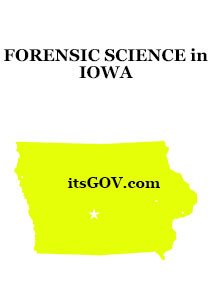Forensic Science
Forensic science combines science and investigation in order to aid and support the prosecution or defense in criminal and civil investigations. While the profession has been widely romanticized by various TV shows, make no mistake – this job is most likely different that you expect. In contrast with popular perception, this is a highly scientific role, which often involves detailed, painstaking work. Field duties are limited to a few areas of expertise, and most often than not a forensic scientist will spend his time in the lab.
If you made it this far, though, congratulations! You’re taking the first steps in joining a very rewarding profession and itsGOV is here to guide you through what you need to know and what you need to do to join a forensic science program in Missouri.
Depending on the type of forensic science practiced, different degrees and educational backgrounds may help a candidate get a job and excel in this field. Regarding formal education, requirements vary across jobs, but you should definitely have a solid background in mathematics, biology and chemistry.
The National Institute of Justice, a division of the U.S. Department of Justice, offers guidelines for model undergraduate and graduate forensic science degree programs. According to the American Academy of Forensic Science, strong programs should offer a curriculum that concentrates on scientific writing, laboratory skills, public speaking, and computer software application training.
Forensic scientists in Missouri are responsible for collecting, identifying, and analyzing physical evidence related to criminal investigations. They may perform tests on weapons or substances to determine their significance related to an investigation, and they may also be called upon to testify as an expert witness.
Entry-level forensic scientists must possess at least 60 college credit hours from an accredited college or university, and all candidates must be able to pass a polygraph examination and submit to periodic random drug testing. Further education, professional certification and/or experience may be required for specialized or advanced forensic scientist jobs in Missouri.
Forensic Science Requirements in Missouri
The Crime Lab Division (CLD) of the Missouri State Highway Patrol, which was established in 1936—one of the first of its kind in the country—provides forensic science services and technical support to all local, state and federal law enforcement agencies in Missouri, from Kansas City and St. Louis to Springfield and Independence, through the utilization of state-of-the-art equipment and techniques.
The CLD’s central laboratory is located in Jefferson City, with regional labs located in:
- Macon
- St. Joseph
- Carthage
- Park Hills
- Springfield
- Willow Springs
- Cape Girardeau
Forensic scientists of the Missouri CLD provide the following services to criminal justice and law enforcement agencies within the state:
- DNA Coursework
- Drug Chemistry
- CODIS
- Firearms and Toolmarks
- Latent Prints
- Toxicology
- Trace Evidence
Forensic Science Training in Missouri
According to recent statistics by the Missouri Department of Elementary and Secondary Education, Division of Career Education, the most common degree for forensic science technicians (45.7 percent) is a bachelor’s degree. It is therefore easy to find a number of degree-granting schools offering bachelor’s degrees in forensic science and related disciplines in Missouri.
Many forensic science bachelor’s degrees also allow students to focus their undergraduate degree on a specific area, thereby preparing them to work in specialized areas of forensic science, such as DNA, toxicology, and latent prints, just to name a few.
Bachelor of Science in Forensic Science
A Bachelor of Science in Forensic Science prepares students for careers in forensic science laboratories. This type of degree draws from a number of areas, including the biological sciences, physics, chemistry, and the criminal justice system. As such, it is often considered a cross-disciplinary program, as study is focused in both the scientific and social environments of crime and criminal justice.
Forensic Science Salary in Missouri
Job growth in the field of forensic sciences is promising in Missouri. The state’s Department of Economic Development projects an increase of 14.89% in the availability of forensic science jobs from 2010 to 2020. Of the 188 jobs they expect to become available during this ten year period, 74% are expected to be due to the replacement of people leaving the workforce.In 2012, there were 320 forensic science technicians employed in Missouri according to the Bureau of Labor Statistics (BLS). The annual median wage throughout the state was $45,270 in 2012. Those in the top 90th percentile of their wage bracket made an average of $65,970 that year.
A criminalist specializing in toxicology earned from $48,040 to $52,176 a year in 2013 in Springfield.
Other types of jobs for forensic scientists include processing the evidence at crime scenes to preserve it for further analysis. Such crime scene investigators (CSIs) can be either police officers or detectives with training in forensics or they can be civilians who have some educational background in forensics or criminal justice.
Salaries vary for CSIs depending on their level of experience. According to Indeed.com, the average salary for a crime scene investigator in Missouri was $56,000 in the period from September 2012 to October 2013.
Forensic Science Schools and Colleges in Missouri
Bachelor’s Degree Programs in Missouri
| University | Colorado Technical University, Forensic Investigation Concentration B.S. |
| Duration | 4 years |
| Type | Full time, Part time |
| Tuition and fees | $14,950 per year |
| Program link |
| University | Columbia College, Forensic Science B.S. |
| Duration | 4 years |
| Type | Full time, Part time |
| Tuition and fees | $21,200 per year |
| Program link |
| University | University of Central Missouri, Forensic Chemistry B.S. |
| Duration | 4 years |
| Type | Full time, Part time |
| Tuition and fees | $26,300 per year |
| Program link |
Master’s Degree Programs in Missouri
There are currently no master’s programs offered in Missouri.




